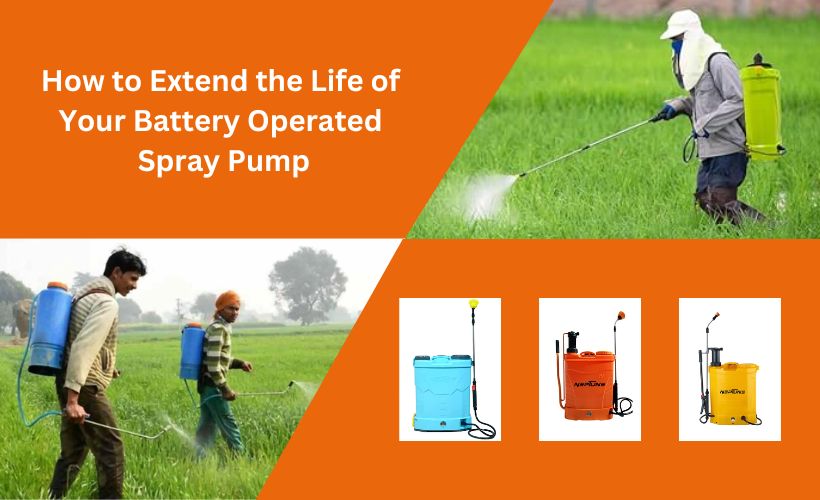Pesticides, herbicides, and fertilizers can be sprayed effectively and dependably with battery operated spray pump, which are vital equipment for contemporary agriculture. Known by another name, battery sprayer pumps, these tools are essential for preserving crop health and increasing yield. It’s crucial to adhere to specific maintenance and usage requirements if you want your battery sprayer for agriculture to last for a very long time. In addition to answering some often-asked questions about using a battery-operated spray pump, we will look at several doable solutions to prolong its lifespan in this blog.
Understanding Your Battery Operated Spray Pump
It is important to comprehend the basic parts and operation of your battery spray pump before delving into maintenance advice. Usually, a battery, a motor, a pump, a tank, and a nozzle make up these devices. The pump generates pressure and sprays liquid from the tank via the nozzle with the help of the motor, which is powered by the battery. Gaining an understanding of these parts can enable you to take better care of your equipment.
Tips to Extend the Life of Your Battery Operated Spray Pump
1. Appropriate Charging Procedures
Making sure you’re charging your agriculture spray machine with battery correctly is one of the most important parts of maintaining it. An excessive or insufficient charge can drastically shorten the life of a battery. Always adhere to the charging schedules and guidelines provided by the manufacturer.
– Use the Correct Charger: Make sure to utilize the charger that came with the device. The battery’s longevity may be shortened and harm may result from using improper chargers.
– Avoid Overcharging: After the battery is fully charged, disconnect the charger to avoid overcharging, which can cause the battery to overheat and deteriorate.
– Regular Charging: To prevent the battery from completely draining, which could damage the battery cells, charge the battery regularly if the spray pump is not used frequently.
2. Continual Upkeep and Cleaning
For your battery-operated spray pump to last a long time, it must be kept clean. Chemical and fertilizer residues have the potential to erode the pump’s parts and decrease its efficiency.
– Rinse After Use: To get rid of any leftover chemicals, rinse the tank, nozzle, and hoses with clean water after each use. This stops rusting and clogging.
-Inspect for Spills: Check the pump frequently for damage or leakage. Deal with any problems as soon as possible to stop more harm.
– Moving Parts Lubricate: Certain parts, including the motor and battery spray pump, might need to be lubricated. To find out how to do specialized maintenance, consult the manufacturer’s manual.
3. Handle Storage Correctly
Your battery-operated spray pump will last longer if it is stored properly, especially during the off-season or extended periods of inactivity.
– Clean Before Storage: To avoid mold and rust, make sure the pump is completely cleaned and dried before storing it.
– Store in a Cool, Dry Place: Steer clear of moist or overly hot storage spaces for the agriculture spray machine with battery as they can harm the battery and other parts. -unplug the Battery:To avoid any possible drain and extend the battery’s life, unplug the battery from the spray pump while it is being stored, if at all possible.
4. Make Use of the Correct Chemicals
Certain chemicals are incompatible with spray pumps that run on batteries. The incorrect chemicals used can shorten the pump’s life and cause harm.
– Examine Compatibility: To make sure the chemicals you use are safe for the pump, always adhere to the manufacturer’s instructions.
– Adequate Diluting: Make sure you dilute chemicals following the manufacturer’s recommendations. Employing excessively concentrated solutions may block the pump and harm it.
5. Track Performance and Usage
Keep a regular eye on the battery sprayer pump operation to spot any problems early.
– Observe Spray Pattern: A steady spray pattern signifies proper operation of the nozzle and pump. It could be time to clean or replace the nozzle if you see any anomalies.
– Verify the battery life: Monitor the battery’s performance and longevity. It might be time to replace the battery if you observe a noticeable drop in battery efficiency.
Conclusion
Your agricultural operations might be greatly improved by a well-maintained battery-operated spray pump that provides dependable and effective performance. You can prolong the life of your battery sprayer for agriculture and ensure it continues to be a valued tool for many years by heeding the advice provided above. If you want to get the most out of your agriculture spray machine with a battery, you need to charge, clean, store, and use it properly. Remember these recommendations.
Frequently Asked Questions
Q1. How frequently should I charge my spray pump that runs on batteries?
After every use, it’s advisable to recharge your battery-operated spray pump. To keep the battery from completely draining and to preserve its efficiency, charge the pump’s battery at least once every three months if it is not used frequently.
Q2. What should I do if the spray pump that runs on batteries runs out of juice?
Make sure you are using the correct charger and that the charging port is clean and undamaged before attempting to fix a battery sprayer pump that isn’t holding a charge. It could be necessary to change the battery if the problem continues. For information on compatible replacement batteries, refer to the manufacturer’s specifications.
Q3. Can I use different kinds of chemicals with my battery-operated spray pump?
Even though battery-operated spray pumps are very flexible, confirming the chemical compatibility is crucial by consulting the manufacturer’s instructions. Certain substances might be too thick or corrosive for your pump. Between uses, make sure the pump is fully cleaned to avoid cross-contamination and damage.




